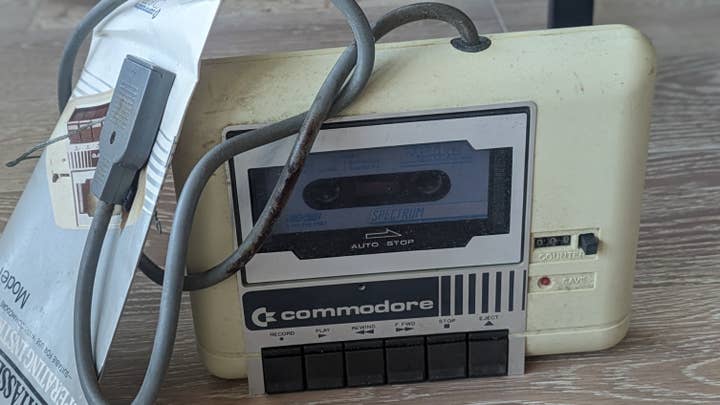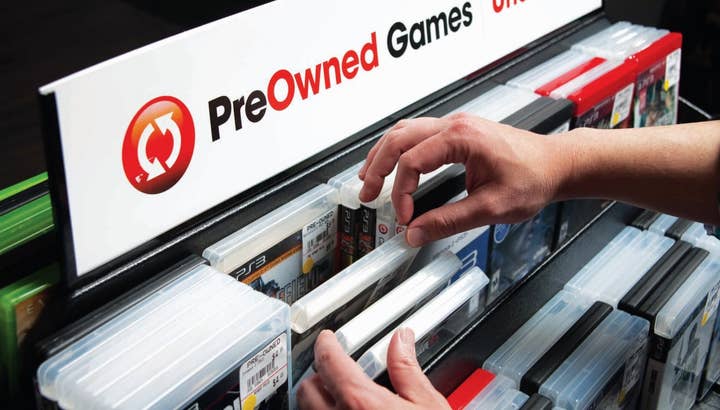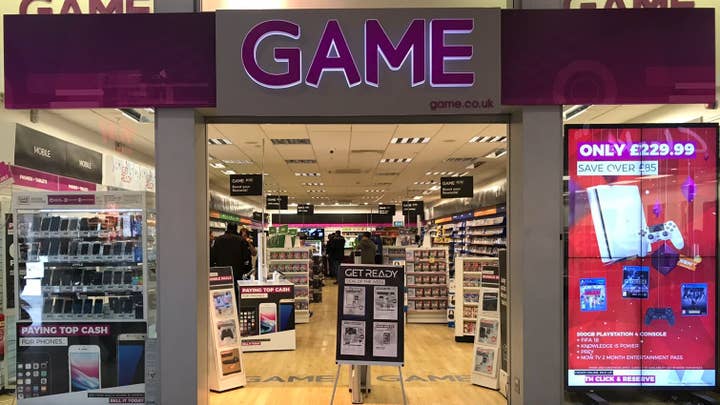Getting used to it | This Week in Business
GAME is ending its trade-in program, once denounced as a scourge of the industry. So why aren't we seeing more celebrating?
This Week in Business is our weekly recap column, a collection of stats and quotes from recent stories presented with a dash of opinion (sometimes more than a dash) and intended to shed light on various trends. Check every Friday for a new entry.
Monday was a day the games industry had been waiting for a long time, as UK retailer GAME reportedly informed staff that it would be exiting the pre-owned game market, and would stop accepting customer trade-ins of games beginning February 16.
There was a time when this would have been cause for celebration in the industry, which may sound absurd in 2024 but not half as absurd as the vitriolic way otherwise respectable games industry executives talked about used games a couple generations ago.
QUOTE | "OK, so basically the industry now has the used-game virus." – In a 2009 blog post during his free-to-play Acclaim days, David Perry compared second-hand sales to a disease and said used game stores were "stabbing the industry in the back."
QUOTE | "One of the greatest things about digital distribution is what it does to reduce the used game market. I hope digital distribution stabs the used game market in the heart." – In 2011, Obsidian chief creative officer Chris Avellone indulges in violent fantasies about a world where players can't trade their games in .
You see? Video games don't make people violent, but used video games sure seem to.
Industry execs offered arguments against used games that were either foolishly simple-minded or cynically self-interested
When they weren't getting needlessly stabby about used games, industry execs offered arguments against it that could be described as foolishly simple-minded or cynically self-interested, depending on your point of view.
QUOTE | "We believe used games aren't in the consumer's best interest. Describe another form of entertainment that has a vibrant used goods market. Used books have never taken off. You don't see businesses selling used music CDs or used DVDs. Why? The consumer likes having a brand-new experience and reliving it over and over again. If you create the right type of experience, that also happens in videogames." – In a 2009 interview, Nintendo of America president Reggie Fils-Aimé headfakes like he's about to explain why actual ownership of games isn't in the consumers' best interests, but then pivots to ignore the existence of second-hand book, DVD, and CD stores.
Fils-Aimé would presumably have a change of heart on this point as he joined the GameStop board of directors in 2020.
QUOTE | "I'd actually make the point that for us second-hand sales is a very critical situation, because people are selling multiple times intellectual property… In our understanding of the business model we are actually giving away the rights to play, and if you just pass it on, pass it on, pass it on, that is not comparable to second-hand sales in the normal physical goods area where you have physical wear-out – second-hand cars, second-hand clothes, second-hand books... they're all physically wearing out, so you have an inferior quality product." – EA senior VP and GM for European publishing Jens Uwe Intat, in a 2008 interview with us.
Note how Intat laments "giving away" the right to play a game as if the company weren't receiving anything in exchange for it, as if obtaining that right were not the entire point of the transaction in the consumer's mind.
Further note how Intat erroneously suggests that game cartridges and discs are somehow immune to physical wear and tear, and then suggests there should be a difference in the right of re-sale between a durable item and one that is more expendable. I wonder if Intat has ever owned real estate, and how he feels about the idea of its previous owner preventing him from selling or modifying it as he sees fit.

Like Fils-Aimé, Intat would also see the light and is currently on the board of directors for European second-hand electronics and media platform Rebuy.
You know what? I think I would have preferred foolishly simple-minded.
And of course, going beyond the needlessly violent and/or flimsy arguments, there were hyperbolic predictions of doom and destruction.
QUOTE | "The real cost of used games has been the destruction of the mid-tier publisher and the elimination of many an independent development studio who in the past conducted work in that space. With next generation budgets leaping yet again only the 'mini-publishers' – such as Epic, Insomniac, Bungie – can possibly survive externally to an actual publisher. Beneficial to the customer? No." – In a 2012 guest editorial, former THQ VP of Core Studios Richard Browne blamed the decline of mid-tier publishers on used games.
Browne must be happy today, what with the rise of digital making used games into a non-issue for the industry and ushering in an unprecedented era of smooth sailing for mid-tier publishers unburdened by escalating budgets fueling the trend of consolidation as companies either get eaten or become big enough to eat others.
"Pre-owned has really killed core games. In some cases, it's killed them dead"David Braben
Now to take a big sip of coffee and read up on games industry news and my favorite "mini-publishers" of the past dozen years or so…
QUOTE | "The real problem when you think about it brutally, if you look at just core gamer games, pre-owned has really killed core games. In some cases, it's killed them dead." – Frontier Developments' David Braben in 2012.
Sometimes I forget that there have been no core gamer games in a dozen years now, on account of them being killed, in some cases killed to the point of death.
(Braben also said used games were "defrauding the industry" by not distinguishing between used and new games – not defrauding customers, but the industry – so maybe our expectations when it comes to precise word choice were set a bit high.)

The point is that there was widespread loathing for second-hand retailers like GameStop and GAME throughout the industry. And to be fair, it wasn't hard to see where it was coming from.
Publishers spent millions on marketing to get people to buy their games, and when they finally convinced people to make that purchase at the local branch of a retail partner that was all decked out in the promotional material and posters the publisher had paid for, there was a good chance that employees were pushing the customer not to buy the $50 new copy of a game but the $45 used copy, $0 of which would go back to the publisher.
When mainstream retailers launched buyback programs, the industry explored more active ways to sabotage the second-hand market
It was bad enough when it was just GameStop and GAME, but in the late '00s retailers like Best Buy, Amazon, Walmart, HMV, and Toys R Us launched their own buyback programs and trials, prompting the industry to explore more active ways to sabotage the second-hand market.
EA launched Project $10 across Dragon Age Origins and EA Sports titles, requiring players entire a one-time-use code packed in with new copies of a game in order to access multiplayer modes or bonus DLC in games. It would also sell that same access or content through platform-holder stores, so people who bought the game used could get it if they were willing to pay $10, essentially eliminating the cost-advantage of buying used copies for recently released games.
THQ then pulled a THQ and mimicked its AAA big brother in a half-assed manner with its own online play scheme we'll go ahead and call Project $5.
In April of 2010, Sony filed a for a Japanese patent on a way to "suppress" used game sales with RF tags on games and a reader/writer on the console itself that would let the company tie a game purchase to a single system.
And of course, Microsoft announced the Xbox One in 2013 with online requirements and a plan that would let publishers decide whether or not their games be resold. The idea was scrapped within two weeks because of overwhelming pushback from gamers, and Xbox head Don Mattrick left the company in the middle of a console launch campaign two weeks after that.
Microsoft relented on its push, Sony never used its patent, EA dropped Project $10 because "many players didn't respond to the format," and THQ soon went bankrupt anyway. But used games have withered regardless as the industry has largely shifted over to higher-margin digital sales. Even the supposed scourge of the industry, GameStop, stopped reporting revenues from second-hand sales in 2019 after it became clear the business of selling used copies of games was in irrevocable decline, in large part because there aren't physical copies of games to re-sell in the first place.
STAT | $2.7 billion – Activision Blizzard's revenue from retail channels for 2013.
STAT | $290 million – Activision Blizzard's revenue from retail channels for 2022.
STAT | $2.36 billion – EA's packaged goods revenues in fiscal year 2013.
STAT | $675 million – EA's packaged goods revenues in fiscal year 2023.
I don't know if you've noticed, but EA and Activision Blizzard haven't gotten any smaller in the past decade, so these cratering retail numbers are happening in the face of operations that are otherwise thriving and growing.
Even Nintendo has seen downloads on the verge of eclipsing physical sales
It's a similar story across the board for major publishers, with the rate of erosion seemingly accelerating. EA's packaged goods revenues are down 45% just since 2019. Activision Blizzard's are down 68%.
Nintendo is an outlier among major game companies on this front, but even it has seen downloads on the verge of eclipsing physical sales.
STAT | 48% - The amount of Nintendo's software sales accounted for by digital copies in fiscal 2023, up from 34% in fiscal 2020. Individual quarters have already seen the digital mix push north of 50%.
The irony here is that all those tactics were taking advantage of the advent of digital distribution and online connectivity, but none were as effective at destroying the used game market as digital distribution and online connectivity on their own. Everything the companies did to usurp used games hurt their customers and burned good will unnecessarily in an attempt to accelerate an end to used games that was almost certainly going to happen anyway.
That's why GameStop and its fellow game retailers have desperately (and futilely) tried to establish a Plan B for when the bottom fell out.
You might remember GameStop trying out new store concepts straying from its standard game store format in 2020, or GAME trying something similar with its Belong stores in 2016.
But retailers have long known where this was all headed, and the efforts to adapt to a digital-first industry go back a lot further than that.
DATE | June 7, 2001 – Future GameStop subsidiary Electronics Boutique announced EB1, a "streaming software rental site" that would allow people to enjoy PC games like Serious Sam and Unreal Tournament on a rental basis. (It was shut down after about a year.)
Retailers knew they were in for a fight because digital distribution has obvious benefits in terms of convenience and availability, both for the people buying games and the people making them.
But it also has significant drawbacks in getting people used to the idea of paying money for games but not owning them in any way that matters. That was at the heart of one of the big news stories of the week, thanks to comments Ubisoft director of subscriptions Philippe Tremblay made to us in an otherwise innocuous interview on the company's subscription and streaming plans.
QUOTE | "One of the things we saw is that gamers are used to, a little bit like DVD, having and owning their games. That's the consumer shift that needs to happen. They got comfortable not owning their CD collection or DVD collection. That's a transformation that's been a bit slower to happen [in games]. As gamers grow comfortable in that aspect… you don't lose your progress. If you resume your game at another time, your progress file is still there. That's not been deleted. You don't lose what you've built in the game or your engagement with the game. So it's about feeling comfortable with not owning your game." – Ubisoft's Tremblay reassures everybody that paying money to rent game access instead of owning anything is OK because… game progress won't be deleted?
That reassurance of permanent access to one's progress would probably have meant more if Ubisoft wasn't doing things like shutting down servers on always-online games like The Crew, nuking not just player progress but the game as well.

Regardless, Tremblay's comments got a segment of the gaming audience heated on social media, in comments, and on message board threads. I think that's partly due to his phrasing being easy to take a couple different ways. Is he saying that shift to not owning things "needs to happen" because people owning things is undesirable at all and Ubisoft wants to make it happen? Or is he saying that shift "needs to happen" if subscription and streaming are going to be the Next Big Thing some people have predicted?
Part of the backlash the Ubisoft executive received over his comments is because he's basically right
But I think another part of the backlash Tremblay received over his comments is because he's basically right. Gamers have a history of getting used to all kinds of things they hated at first.
They got used to load times when CDs came around. They got used to downloadable content after the Oblivion horse armor outrage. They got used to paying money for multiplayer functionality. They got used to requirements to create publisher-specific user accounts to play games. They got used to free-to-play. They got used to $60 games, and are now getting used to $70 games.
We talked about this a little bit in last week's column when we brought up a 2013 Kotaku interview dealing with the initial reaction to The Crew's always-online requirement.
QUOTE | "People got used to it on World of Warcraft, people got used to it on MMOs." - The Crew creative director Julian Gerighty made it clear that Ubisoft knew people were complaining about the always-online decision, but was confident the angry critics would blink before Ubisoft did.
Gerighty, Ubisoft, and indeed a huge swath of the industry were right on this point back then. So of course, they learned from that experience and have continued to do business knowing that backlash is a difficult thing to keep up indefinitely. Before long, it exhausts itself, and people will put up with all kinds of stuff, especially if the negative consequences of it are slowly revealed over time, like the proverbial boiling frog.
Despite that slow reveal, it's not exactly a big secret when it happens, of course. Even as the industry's violent rhetoric around re-sale was ramping up, our own Rob Fahey clearly identified it as an attack on the consumer's rights of first sale in response to an even earlier Braben call for DRM to thwart second-hand sales.
QUOTE | "What Braben and others in the industry want to do is to usurp this right, not through legal means but through technical restrictions. There's something very questionable about the basic morality of using technical instruments unthought-of when such laws came into force to circumvent the law and rob consumers of basic rights. Exhaustion of Rights and Right of First Sale aren't some grubby legal loophole that consumers are using to rob hard-working developers of their money – they're a fundamental part of the covenant between nation and creator which gives us the copyright laws and allows creators to make money in the first place." – Fahey, in his 2008 editorial.
Ownership feels like such a far-fetched fantasy these days that it was a large component of the pitch for blockchain and NFTs
It's actually gotten so bad that ownership, the thing that we previously just assumed we would get when we paid for a new game, feels like such a far-fetched fantasy these days that it was a large component of the pitch for blockchain and NFTs; con artists have a long history of promising things that seem too good to be true.
Speaking of which, let me take a moment to bask in something not only glorious, but also a relevant example of the desperate retailers' search for a Plan B I mentioned earlier.
QUOTE | "GameStop has decided to wind down our NFT marketplace due to the continuing regulatory uncertainty of the crypto space. Effective as of February 2, 2024, customers will no longer be able to buy, sell or create NFTs. Your NFTs are on the blockchain and will remain accessible and saleable through other platforms." – A notice posted to GameStop's NFT marketplace this week.
Ooooo, that's the stuff.
I look forward to many more such notices using the phrase "due to the continuing regulatory uncertainty of the crypto space" in place of "because we joined an appallingly wasteful pyramid scheme looking to find a greater fool but whoops it turns out such a fool did not exist."

GameStop, in 2024: "Moon's haunted."
Schadenfreude aside, I don't believe these companies deliberately sought to undermine consumer rights so much as they simply saw the advantage of having more control over their products, and digital distribution and online connections made it possible for them to get it.
But it's a zero sum game. Every iota of control the publishers have gained through the shift to digital has come at the expense of players. Every new restriction companies adopt mean consumers lose something they could previously do with the games they paid for.
And they have an incredible amount of control now. They can reach out to your device from afar and unilaterally take away content you paid for, make it so your peripherals won't work anymore, or brick your system for any imagined offense they come up with.
Our "ownership" of the games and systems we pay for is flimsy at best, and fading more every year
Our "ownership" of the games and systems we pay for is flimsy at best, and fading more every year. Games are pivoting to live services and platforms are leaning into streaming and subscription models.
And if there's one thing we know about such services (whether they be games or social media platforms or search engines or even game engines), it's that they are never the same for long.
They go through good times and bad. They often change how they work. They get sold. They get more expensive. They change on an executive team's whim. They are impermanent by design. They disappear completely. They give users no control, no real ownership.
And this is why the industry hasn't responded to GAME pulling out of the used games business with the same celebratory joy of me seeing GameStop admit defeat on NFTs. Because for all the hyperbole and hand-wringing, publishers and developers weren't upset about the existence of used games so much as they were upset about their lack of complete and utter control over the industry, over who can enjoy their games and how.
So even though they may not be popping champagne bottles in the various headquarters of industry trade groups around the world this week, we can still offer our congratulations. Because there may not have been a singular definitive victory to mark the end of the war on consumer ownership of games, but for all intents and purposes, it has been over for quite some time.
The rest of the week in review
QUOTE | "Whatever the future of games looks like, content will always be king. But it's going to be a lot harder to get good content if subscription becomes the dominant model and a select group gets to decide what goes to market and what [does] not. Direct from developer to players is the way." – In response to the comments from Ubisoft's Tremblay about people getting used to not owning games, Larian Studios CEO Swen Vincke explained why the Baldur's Gate 3 developer won't be putting its games into subscription services.
STAT | 22% - The portion of QA developers surveyed as part of GDC's State of the Games Industry Survey who had been laid off in the prior 12 months. Among business and finance professionals, just 2% had been laid off. Among all 3,000 respondents, 7% said they had been laid off.
STAT | 10 – The number of stories we had this week about layoffs and closures. Wimo and Double Loop Games shut down entirely, while we saw job cuts at Lost Boys Interactive, Thunderful, Pole to Win, Netspeak, Pixelberry, CI Games, Behaviour Interactive, and 31st Union.
STAT | $110 million – The amount of funding raised by Build a Rocket Boy in its Series D round. Nice to see that someone is actually investing in games. Here's hoping people who aren't ex-Rockstar executives and key producers behind the Grand Theft Auto franchise will be able to find support this year as well.
STAT | 100 – The supposed number of developers who will be employed by Rocksteady co-founders Sefton Hill and Jamie Walker's new AAA studio, Hundred Star Games. It's an eye-catching gimmick, but given the problems this industry has with scope control and estimating how long anything will take to make or how difficult any given task will be, I can't imagine a studio actually setting the team size in stone and working backward from there.
STAT | 1% - US spending on games grew 1% last year, according to Circana's monthly sales report for December.
STAT | 36% - The percentage of active PS5 users who played Fortnite at least once last month, according to the same report.
STAT | 0 – The amount of time the US Supreme Court had to hear Epic and Valve continue their legal beef, which means Epic's lone victory in the case – forcing Apple to allow developers to link to external payment options so they can avoid the platform holder's 30% cut of revenues – goes into effect.
STAT | 27% - The commission Apple will take on any proceeds from links to alternative payment options, basically making a mockery of this whole thing and inviting even harsher judicial and legislative crackdowns on tech companies flexing their blatantly anti-competitive market positions.
QUOTE | "If you're hiring diverse people, then support them to stay there. Some people need more help to be able to stay in the industry than others. It's not because they're not trying, it's because they have a lot more to deal with than some other people." – In a feature on reducing barriers for underrepresented groups in the industry, Startmenu editor-in-chief Lex Luddy underscores that while some barriers impact everyone, they can impact visibly underrepresented and economically disadvantaged people in additional ways.
QUOTE | "While the majority of localizations in Iran are typically done through unofficial means due to a lack of opportunity, this project is officially localized with the supervision of Ubisoft. This is unprecedented in the industry." – Moj-e Kitab project manager Lida Mahmoudi says Prince of Persia: The Lost Crown's full Persian localization is a big step forward.
STAT | More than 3,000 – The total number of Rock Band songs Harmonix has released between the games and their DLC since the original game's debut in 2007. The studio said this week it would be releasing its final DLC for the latest game in the franchise, Rock Band 4, on January 25.
STAT | 10 – The number of tips for overcoming imposter syndrome that you can find in this feature with the headline, "Ten tips for overcoming imposter syndrome."
STAT | 0 – The number of those tips that will help if your job is to compile interesting stats and quotes from the week's stories and that's the best you can do. Oh well!









